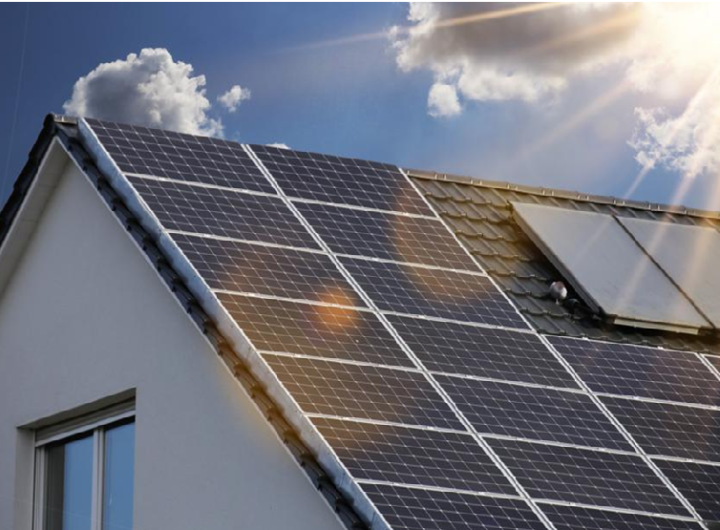
In an era where energy independence and sustainability are becoming increasingly important, going off the grid has become a desirable goal for many individuals and communities. Solar panels with battery storage offer a revolutionary solution to achieve true energy independence. This article explores how this combination can transform your energy consumption and revolutionize your path to self-sufficiency.
Solar panels, also known as photovoltaic (PV) panels, are devices that harness sunlight and convert it into electricity through the photovoltaic effect. They consist of multiple solar cells that generate direct current (DC) electricity when exposed to sunlight. Alongside solar panels, battery storage systems play a crucial role in enabling energy independence. Rechargeable batteries store the DC electricity for later use, ensuring a continuous power supply even when the sun is not shining.
Breaking free from the grid is a liberating experience. Solar panel systems with battery storage provide a consistent and abundant power source, eliminating dependence on the electrical grid. By generating and storing your own electricity, you can free yourself from utility companies and fluctuating energy prices. This newfound energy self-sufficiency empowers individuals and communities to take control of their energy consumption.
The benefits of going off the grid with solar panels and battery storage are numerous. Firstly, it offers energy resilience during power outages or emergencies. Your solar panel system with battery storage can keep essential appliances and systems running, ensuring an uninterrupted power supply when the grid fails. Additionally, going off the grid can lead to significant cost savings. By reducing reliance on the grid and avoiding peak electricity rates, you can lower your energy bills and achieve long-term financial savings.
Environmental impact is another important aspect. Going off the grid with solar panels and battery storage reduces reliance on fossil fuels and helps combat climate change by producing clean, renewable energy. It enables you to contribute to a greener future and reduce your carbon footprint. Furthermore, the optimization of energy usage is a key advantage. Battery storage allows you to store excess solar energy generated during the day and use it during nighttime or periods of high demand. This maximizes your energy efficiency and minimizes waste.
Assessing your energy needs is essential when considering going off the grid. Calculate your household’s electricity usage to determine the size and capacity of the solar panel system and battery storage needed for your energy requirements. Consider factors such as geographical location, available sunlight, and the desired level of energy independence to determine the optimal system size that meets your needs.
It’s important to note a few considerations for off-grid living. Regular inspection and maintenance of solar panels, batteries, and other components are crucial for ensuring the longevity and efficiency of your off-grid system. Additionally, having backup power sources like generators or alternative energy systems is wise for extended periods of inclement weather or unforeseen circumstances.
Solar panels with battery storage have the power to revolutionize your energy independence by allowing you to go off the grid. With a reliable and sustainable power supply, reduced reliance on the electrical grid, and potential cost savings, this combination empowers.
individuals and communities to take control of their energy consumption. Embracing solar panels with battery storage technology opens up a world of possibilities for achieving energy independence and contributing to a cleaner and greener future.
What are Solar Panels?
Solar panels, also known as photovoltaic (PV) panels, are devices that harness sunlight and convert it into electricity through the photovoltaic effect. Each solar panel is composed of multiple solar cells, which are typically made from silicon. When sunlight hits these cells, it excites the electrons, causing them to flow and generate an electric current. This direct current (DC) electricity is then converted into alternating current (AC) electricity through an inverter, making it compatible with the electrical systems used in homes and businesses.
Solar panels have become a key component of the renewable energy revolution. They offer a sustainable and clean method of generating electricity, helping to reduce reliance on fossil fuels and combat climate change. Solar energy is an abundant resource that is freely available, making it a viable option for both residential and commercial applications. The technology behind solar panels continues to advance, with increasing efficiency and decreasing costs, making it more accessible to a wider range of people.
Investing in solar panels offers numerous benefits beyond environmental considerations. By generating electricity from the sun, solar panels help to reduce dependence on traditional utility companies and lower energy bills. They provide a reliable and long-term energy solution, as sunlight is an abundant resource that can be harnessed for decades. Solar panels also offer the potential for energy independence, allowing individuals and communities to generate their own power and become less reliant on the electrical grid. This not only provides a sense of self-sufficiency but also offers resilience during power outages or emergencies. With their durability and low maintenance requirements, solar panels are a smart investment that can bring both financial and environmental advantages.
What is Solar Battery Storage?
Solar battery storage is a technology that complements solar panel systems by allowing the excess energy generated during daylight hours to be stored for later use. Solar battery systems consist of rechargeable batteries that store the DC electricity produced by solar panels. This stored energy can then be used when the electricity demand is high or during periods when the solar panels are not actively generating electricity, such as at night or during cloudy weather.
Solar battery storage provides several key advantages. One of the primary benefits is energy independence. By storing the excess energy generated by solar panels, individuals and communities can become less reliant on the electrical grid and utility companies. This independence offers a greater level of control over energy usage and reduces vulnerability to power outages or fluctuations in the grid.
Another advantage of solar battery storage is the ability to maximize energy efficiency. Rather than sending excess energy back to the grid, which may result in limited compensation or wasted energy, storing it in batteries allows for its efficient utilization. The stored energy can be discharged during peak demand periods, helping to offset high electricity prices and reduce reliance on grid energy during these times. This optimization of energy usage can lead to significant cost savings over time.
Furthermore, solar battery storage enhances the resilience and reliability of a solar panel system. During power outages or emergencies, the stored energy in batteries can provide a backup power supply, ensuring that critical appliances and systems remain operational. This added layer of security contributes to peace of mind and allows for continued functioning during unforeseen circumstances.
What are the Benefits of Solar Panels with Battery Storage?
The combination of solar panels with battery storage offers a range of benefits that further enhance the advantages of solar energy:
One of the key benefits is increased energy independence. Solar panels generate electricity directly from sunlight, and with the addition of battery storage, excess energy can be stored for use when the panels are not actively producing electricity. This allows individuals and communities to have a continuous and self-sustained power supply, reducing reliance on the electrical grid and utility companies. It provides a sense of autonomy and control over energy consumption, fostering a greater level of energy independence.
Solar panels with battery storage also offer the advantage of resilience and reliability. During power outages or emergencies, the stored energy in batteries can serve as a backup power supply, ensuring that essential appliances and systems continue to operate. This is particularly important in regions prone to natural disasters or areas with unreliable grid infrastructure. The ability to maintain power even when the grid is down provides peace of mind and ensures the continued functioning of critical systems.
Financial benefits are another advantage of solar panels with battery storage. By reducing reliance on the grid and drawing from stored energy during peak demand periods, individuals and communities can significantly lower their energy bills. The cost savings from utilizing self-generated solar energy and avoiding peak electricity rates can add up over time, leading to substantial financial benefits and a strong return on investment.
Moreover, solar panels with battery storage contribute to environmental sustainability. Solar energy is clean, and renewable, and emits no greenhouse gases during operation. By utilizing this abundant and clean energy source, individuals and communities can significantly reduce their carbon footprint, mitigate climate change, and contribute to a greener future. The combination of solar panels and battery storage ensures efficient use of solar energy, minimizing waste and maximizing the environmental benefits of renewable energy generation.
In summary, the benefits of solar panels with battery storage are multi-faceted. They provide energy independence, resilience, and reliability during outages, financial savings through reduced reliance on the grid, and environmental sustainability by utilizing clean, renewable energy sources. This combined solution offers individuals and communities the ability to take control of their energy consumption, lower their carbon footprint, and achieve long-term energy security

 Enhancing Home Resale Value With A Quality Air Conditioning Installation
Enhancing Home Resale Value With A Quality Air Conditioning Installation  Solar Financing Options Explained
Solar Financing Options Explained  Common Misconceptions about Aircon Gas Top-up: What You Should Know
Common Misconceptions about Aircon Gas Top-up: What You Should Know  Do Led Recessed Lights Use a Lot of Electricity?
Do Led Recessed Lights Use a Lot of Electricity?  Four spring tips to freshen up your home.?
Four spring tips to freshen up your home.?  How to cool a room without an air conditioner.?
How to cool a room without an air conditioner.?  Expert Lawn Care Services in Lakewood, WA: Nurturing Healthier Yards Year-Round
Expert Lawn Care Services in Lakewood, WA: Nurturing Healthier Yards Year-Round  Choosing Roofing Companies That Specialize in Home Roof Repair
Choosing Roofing Companies That Specialize in Home Roof Repair  Why Do Some Rockville Homes Keep Getting Pests Again and Again?
Why Do Some Rockville Homes Keep Getting Pests Again and Again?  Typical Red Flags When Hiring Pest Control in Indianapolis
Typical Red Flags When Hiring Pest Control in Indianapolis